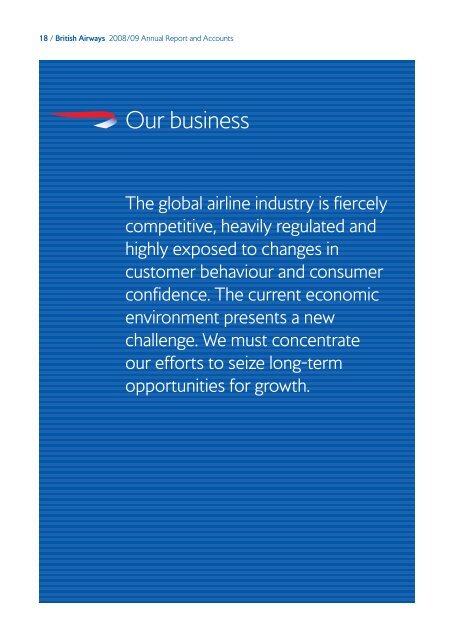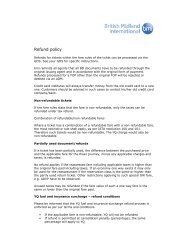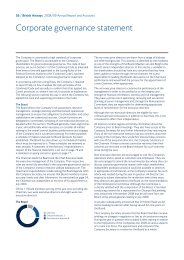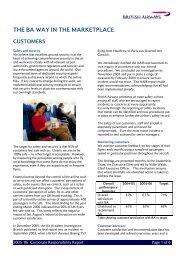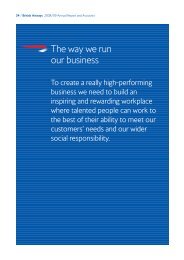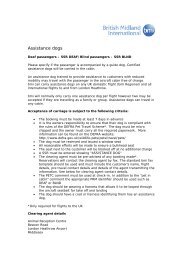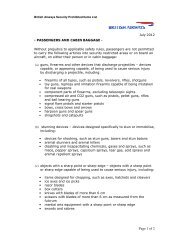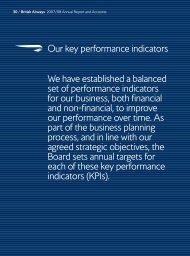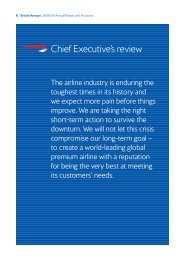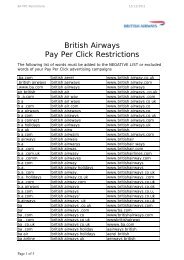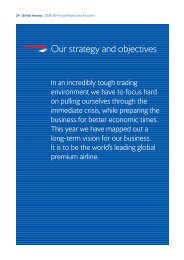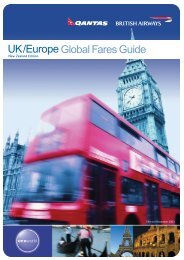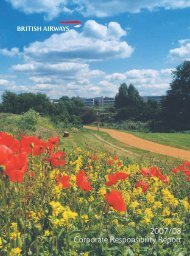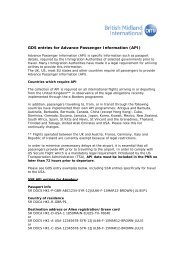Our business (784kb pdf) - British Airways
Our business (784kb pdf) - British Airways
Our business (784kb pdf) - British Airways
You also want an ePaper? Increase the reach of your titles
YUMPU automatically turns print PDFs into web optimized ePapers that Google loves.
18 / <strong>British</strong> <strong>Airways</strong> 2008/09 Annual Report and Accounts<br />
<strong>Our</strong> <strong>business</strong><br />
The global airline industry is fiercely<br />
competitive, heavily regulated and<br />
highly exposed to changes in<br />
customer behaviour and consumer<br />
confidence. The current economic<br />
environment presents a new<br />
challenge. We must concentrate<br />
our efforts to seize long-term<br />
opportunities for growth.
<strong>British</strong> <strong>Airways</strong> 2008/09 Annual Report and Accounts / 19<br />
The markets we operate in<br />
Market overview<br />
The pace of economic slowdown during<br />
the year was faster than most had<br />
predicted. What had first been expected<br />
to be a downturn in key developed<br />
economies turned into a global recession<br />
in the autumn of 2008. With record oil<br />
and commodity prices, sterling collapse<br />
and an unprecedented financial crisis all<br />
striking at once, even those emerging<br />
economies that had been expected to<br />
go untouched by recession saw sharp<br />
declines in growth.<br />
In the UK, growth began slowing in the first<br />
half of the year, whilst the US economy<br />
went into recession in the last quarter. In<br />
both economies, consumer and <strong>business</strong><br />
confidence plummeted due to rising<br />
unemployment, uncertainty in the capital<br />
markets, a continuing squeeze on credit,<br />
the erosion of household budgets and<br />
falling house prices. Growth also slowed<br />
dramatically in many Asian economies.<br />
Government attempts – nationally and<br />
internationally – to halt the financial<br />
crisis through bank bailouts and credit<br />
guarantees staved off what might have<br />
been an even more serious collapse.<br />
Subsequent efforts to stimulate economic<br />
activity are expected by most economists<br />
to take longer to take effect.<br />
It is hoped that these steps will kick-start<br />
the US and UK economies which will<br />
provide some economic growth in 2010.<br />
This should, in turn, provide some basis<br />
for a recovery in our own <strong>business</strong>.<br />
Impact on the industry<br />
The airline industry acts as an economic<br />
barometer. Like our competitors, we feel<br />
the full force of falling confidence quickly<br />
and, on this occasion, dramatically.<br />
During the first half of the year, oil prices<br />
hit a record high of $146 a barrel, forcing<br />
up the fuel costs of all carriers to<br />
unprecedented levels and putting margins<br />
under enormous pressure. Although fuel<br />
prices subsequently fell to about a third<br />
of that level, the onset of recession had<br />
already begun in earnest, forcing many<br />
airlines into financial loss.<br />
Even at these lower levels, fuel remains<br />
a much bigger proportion of airline costs<br />
compared to a few years ago, and the<br />
prospect of renewed volatility in prices<br />
remains a long-term concern.<br />
The most significant impact of the<br />
downturn has been on premium<br />
passengers, with <strong>business</strong>es looking to<br />
cut back sharply on travel to save money.<br />
IATA’s latest figures show that global<br />
premium traffic fell in 2008 by 2.8 per<br />
cent. The rate of decline is increasing, and<br />
IATA has indicated that the year to date<br />
decline for the first three months of 2009<br />
was around 19 per cent. The rate of<br />
decline varied across the world, with trans-<br />
Pacific traffic and routes within Asia most<br />
severely hit.<br />
The impact on <strong>business</strong> travel is likely to<br />
continue for some time. A recent survey<br />
suggested that 47 per cent of <strong>business</strong>es<br />
will take fewer trips in the year ahead.<br />
Individual customers are also looking to<br />
make savings on travel, increasingly seen as<br />
an item of discretionary spend. Consumer<br />
confidence the world over has tumbled.<br />
Though many customers continue to see<br />
a first holiday as an essential rather than<br />
a luxury, most are cutting back on second<br />
and third holidays and short breaks.<br />
For both <strong>business</strong> travellers and<br />
individuals, airline brands that are trusted<br />
to be robust and reliable are more sought<br />
after in tough economic times. Customers<br />
seek assurance that their journeys will go<br />
smoothly. If they travel less, each trip they<br />
do make is all the more important.<br />
The downturn is also making customers<br />
much more price sensitive. They are<br />
looking for value for money, demanding<br />
excellent levels of service and high-quality<br />
standards at lower costs. Less loyal to<br />
brands than in the past, they are now<br />
willing to try out new ones which offer real<br />
value. This presents agile operators with an<br />
opportunity to attract new customers, but<br />
Global premium<br />
demand in key markets<br />
-24.1%<br />
-26.3%<br />
North Atlantic<br />
+1.2%<br />
-17.9%<br />
Within Europe<br />
-9.5%<br />
Within Far East<br />
-6.6%<br />
Europe – Far East<br />
-2.8%<br />
-20.3%<br />
Europe – Middle East<br />
+6.9%<br />
Source: IATA<br />
-10.3%<br />
Total Market<br />
-2.8%<br />
-19.0%<br />
12 months to<br />
December 31, 2008<br />
3 months averaged to<br />
March 31, 2009<br />
“The airline industry acts<br />
as an economic barometer.<br />
Like our competitors,<br />
we feel the full force<br />
of falling confidence<br />
quickly and, on this<br />
occasion, dramatically.”<br />
Overview <strong>Our</strong> <strong>business</strong> Corporate governance Financial statements
20 / <strong>British</strong> <strong>Airways</strong> 2008/09 Annual Report and Accounts<br />
The markets we operate in continued<br />
“Some 35 passenger and<br />
cargo carriers have either<br />
gone out of <strong>business</strong><br />
or been absorbed into<br />
other airlines.”<br />
makes it vital that they keep offering value<br />
for money, reliability and superior service.<br />
Customers are also making more informed<br />
choices. They have become more selfreliant,<br />
thanks to the proliferation of new<br />
information channels such as the internet<br />
and mobile phones. They are using price<br />
comparison sites and seeking out personal<br />
recommendations on service and quality<br />
before booking their trips. We expect this<br />
trend to increase during the downturn.<br />
Metrotwin, our new online community, is<br />
an example of how we are responding to<br />
this social media trend. The new website<br />
‘twins’ London and New York and<br />
publishes recommendations of the best<br />
places to visit in both cities. Metrotwin is<br />
successfully attracting a young, affluent<br />
and influential audience.<br />
Corporate responsibility<br />
While recession is the overriding concern<br />
for most customers, the environment<br />
and corporate responsibility remain very<br />
important issues to them. It is clear from<br />
research that those companies with a<br />
clear and open commitment to behave<br />
responsibly and to manage their<br />
environmental impact have a far greater<br />
chance of building a trusted relationship<br />
with their customers.<br />
Taxation<br />
Governments are increasingly looking at<br />
aviation for additional tax revenues under<br />
the auspices of making airlines pay for<br />
environmental costs. By March 2011,<br />
APD in the UK will have increased by up to<br />
210 per cent from current levels and the<br />
EU will be looking to introduce a system<br />
of payment for carbon emissions.<br />
Competition<br />
In response to the worsening economic<br />
conditions, the airline industry is in the<br />
process of change in a number of areas.<br />
Consolidation<br />
Weaker customer demand coupled<br />
with record fuel prices, has sped up<br />
consolidation in the airline industry. Some<br />
35 passenger and cargo carriers have either<br />
gone out of <strong>business</strong> or been absorbed into<br />
other airlines. In Europe, five independent<br />
airlines have been, or are in the process of<br />
being, taken over by competitors.<br />
In an effort to protect their airline industry<br />
from the effects of the financial crisis and<br />
global recession, some governments have<br />
resorted to bailout programmes. This has<br />
been particularly true in a number of major<br />
emerging markets, most notably China,<br />
India and Russia.<br />
Metrotwin, our new online<br />
community, is an example of<br />
how we are responding to<br />
social media trends. The new<br />
website ‘twins’ London and<br />
New York and publishes<br />
recommendations of the best<br />
places to visit in both cities.<br />
Metrotwin is successfully<br />
attracting a young, affluent<br />
and influential audience.
<strong>British</strong> <strong>Airways</strong> 2008/09 Annual Report and Accounts / 21<br />
Increased competition<br />
Most of the markets in which we operate<br />
are highly competitive. Levels of<br />
competition vary, route by route. On a<br />
few international routes competition is<br />
restricted to national airlines and fares are<br />
regulated. At the other extreme there is<br />
a free market for internal flights within<br />
Europe allowing any European airline to<br />
operate any route and set its own fares.<br />
Shorthaul market<br />
On shorthaul routes, we face competition<br />
in the air and on the ground. Train<br />
operators in the UK are taking a bigger<br />
share of the air/rail travel markets, now<br />
that infrastructure improvements have<br />
cut journey times on key lines such as the<br />
West Coast mainline. Eurostar overcame<br />
disruption caused by the tunnel fire and<br />
carried 10 per cent more passengers in<br />
2008, at a time when demand for flights<br />
from London to Brussels and to Paris fell<br />
by 20 and 13 per cent, respectively.<br />
Budget airlines are continuing to grow, but<br />
have switched their priorities to growth at<br />
continental airports. There has been little<br />
organic growth in their London operations.<br />
At the same time, full service airlines have<br />
reduced their presence in London, cutting<br />
seat capacity by 5 per cent in 2008,<br />
although little of this reduction has been<br />
focused on the airports from which<br />
we operate.<br />
Longhaul market<br />
Deregulation has had a significant impact<br />
on our longhaul <strong>business</strong>. The first phase<br />
of the EU-US Open Skies agreement has<br />
altered the competitive landscape on<br />
transatlantic routes. While seat capacity<br />
in the summer of 2008 rose by just 3 per<br />
cent, the new regime has provoked a sharp<br />
transfer of capacity from Gatwick (down<br />
39 per cent) to Heathrow (up 19 per cent).<br />
Four new US airlines have now won slots<br />
at Heathrow. There have also been new<br />
entrants from Africa and India. Air France<br />
temporarily established a US service<br />
from Heathrow, at a time when our<br />
own OpenSkies subsidiary launched<br />
direct services to the US from Paris<br />
and Amsterdam.<br />
Three airlines have introduced the new<br />
Airbus A380 at Heathrow in 2008, with<br />
a total of 24 departures a week. The<br />
aircraft offers them the chance to enhance<br />
their products.<br />
However, the economic downturn<br />
wreaked havoc in two emerging sectors in<br />
our industry in 2008. We saw the collapse<br />
of three premium-only operators – Maxjet,<br />
Eos and Silverjet. Low cost longhaul<br />
operators, such as Oasis Hong Kong and<br />
Zoom, also went out of <strong>business</strong>, although<br />
other operators have emerged to serve<br />
this market, in which a number of charter<br />
airlines continue to operate.<br />
For both <strong>business</strong> travellers<br />
and individuals, airline brands<br />
that are trusted to be robust<br />
and reliable are more sought<br />
after in tough economic times.<br />
Customers seek assurance<br />
that their journeys will go<br />
smoothly. If they travel less,<br />
each trip they do make is all<br />
the more important.<br />
Three airlines have<br />
introduced the new<br />
Airbus A380 at Heathrow<br />
in 2008, with a total of<br />
24 departures a week.<br />
The aircraft offers them<br />
the chance to enhance<br />
their products.<br />
Overview <strong>Our</strong> <strong>business</strong> Corporate governance Financial statements
22 / <strong>British</strong> <strong>Airways</strong> 2008/09 Annual Report and Accounts<br />
The markets we operate in continued<br />
BAA is being forced by the<br />
Competition Commission<br />
to dispose of Gatwick,<br />
Stansted and either Glasgow<br />
or Edinburgh airports. Such<br />
a move could be beneficial<br />
to Heathrow, ensuring that<br />
it has the right resources<br />
and focused management.<br />
“The UK Government<br />
announced during the year<br />
that it was in favour of<br />
developing a third, short<br />
runway at Heathrow.”<br />
Regulatory controls<br />
Almost every aspect of running an airline<br />
is governed or influenced by a web of tight<br />
regulatory controls. These cover everything<br />
from the routes we fly, to the <strong>business</strong><br />
partners we cooperate with, the airport<br />
slots we use, the fares we set and the<br />
infrastructure costs we pay. Strict rules<br />
also govern safety and security and the<br />
management of our environmental impact.<br />
There were a number of important<br />
regulatory developments during the<br />
year which will have a major impact on<br />
the industry in general and on our own<br />
long-term strategy.<br />
Liberalisation<br />
In April 2009 we completed our third<br />
application to EU and US competition<br />
authorities to operate a joint <strong>business</strong><br />
on north Atlantic routes with our<br />
oneworld alliance partners, American<br />
Airlines and Iberia.<br />
We are seeking the same anti-trust<br />
immunity to run this <strong>business</strong> as is already<br />
enjoyed by our major competitors. Their<br />
respective alliances, Star and Skyteam, are<br />
already allowed to coordinate schedules<br />
and offer customers a range of benefits<br />
and valuable services. Other recent<br />
regulatory changes have made these<br />
routes, and Heathrow in particular, far<br />
more competitive than in the past and we<br />
have argued that the move would bring<br />
real benefits and choice to customers.<br />
We expect a decision in the autumn of<br />
this year.<br />
The second phase of Open Skies is<br />
at a critical stage too. This would give<br />
European carriers reciprocal rights of<br />
access to US airports of the sort that US<br />
carriers now enjoy in Europe. The latest<br />
negotiations are moving slower than we<br />
had hoped. The EU retains the right to<br />
revoke phase one if satisfactory progress is<br />
not made. European airlines are generally<br />
keen to avoid this however, believing that<br />
further liberalisation will provide a longterm<br />
boost for the industry and extend<br />
choice for customers.<br />
UK airports<br />
The UK Department of Transport is<br />
reviewing the way the CAA regulates airport<br />
charges. There is strong pressure for a<br />
review of the way BAA is regulated and for<br />
the introduction of cost-effective charges<br />
that ensure airports are managed efficiently.
<strong>British</strong> <strong>Airways</strong> 2008/09 Annual Report and Accounts / 23<br />
BAA is also being forced by the<br />
Competition Commission to dispose<br />
of Gatwick, Stansted and either Glasgow<br />
or Edinburgh airports. Such a move<br />
could be beneficial to Heathrow, ensuring<br />
that it has the right resources and<br />
focused management.<br />
The UK Government announced during<br />
the year that it was in favour of developing<br />
a third, short runway at Heathrow, subject<br />
to tight environmental conditions being<br />
met in terms of noise, emissions and<br />
air quality. Capacity constraints at the<br />
airport have led Heathrow to fall behind<br />
competing European airports in recent<br />
years, threatening its position as one of the<br />
world’s leading airports. While expansion<br />
would help Heathrow compete more<br />
strongly, the debate over the future of the<br />
airport remains politically divisive and is<br />
likely to stay that way up to the UK general<br />
election and beyond.<br />
Environment<br />
All airlines have to meet a comprehensive<br />
range of local, national and international<br />
environmental regulations. <strong>Our</strong> approach<br />
to these is to comply with all regulations as<br />
an absolute minimum, and to exceed them<br />
in a number of key areas. For example, our<br />
commitment to halve our 2005 net CO 2<br />
emissions by 2050 goes much further than<br />
current industry-wide commitments to<br />
stabilise emissions at 2005 levels by 2020.<br />
Safety and security<br />
Safety is a key priority for us. We have<br />
a formal safety management system in<br />
place which ensures that we meet all<br />
relevant regulations and we operate a<br />
comprehensive monitoring system to<br />
ensure all incidents are reported and<br />
necessary action taken. From the start<br />
of 2009, all IATA member airlines have<br />
been required to pass an International<br />
Operational Safety Audit (IOSA). We<br />
have held IOSA accreditation since<br />
October 2007.<br />
Governments across the world have<br />
introduced a range of security measures to<br />
try to combat the threat of terrorism and<br />
illegal immigration. Airlines continue to<br />
engage with the European Commission,<br />
the UK and other governments to make<br />
sure that these measures are effective<br />
while causing the minimal inconvenience<br />
to customers.<br />
<strong>Our</strong> security department works within the<br />
wider international security framework to<br />
ensure that any threats to our <strong>business</strong> are<br />
minimised and to protect our customers,<br />
worldwide assets, operations and staff.<br />
“Landing fees and en<br />
route charges cost us<br />
£603 million, up 14.2 per<br />
cent. This was mainly due<br />
to the fact that we had to<br />
pay much higher charges<br />
to BAA for using Heathrow<br />
and Gatwick.”<br />
<strong>Our</strong> security department works<br />
within the wider international<br />
security framework to ensure<br />
that any threats to our <strong>business</strong><br />
are minimised and to protect<br />
our customers, worldwide<br />
assets, operations and staff.<br />
Overview <strong>Our</strong> <strong>business</strong> Corporate governance Financial statements
24 / <strong>British</strong> <strong>Airways</strong> 2008/09 Annual Report and Accounts<br />
<strong>Our</strong> strategy and objectives<br />
In an incredibly tough trading<br />
environment we have to focus hard<br />
on pulling ourselves through the<br />
immediate crisis, while preparing the<br />
<strong>business</strong> for better economic times.<br />
This year we have mapped out a<br />
long-term vision for our <strong>business</strong>.<br />
It is to be the world’s leading global<br />
premium airline.
<strong>British</strong> <strong>Airways</strong> 2008/09 Annual Report and Accounts / 25<br />
Progress against our<br />
Business Plan<br />
BP11<br />
The rolling three-year <strong>business</strong> plan,<br />
BP11, set out our agenda for 2008/09.<br />
<strong>Our</strong> main aims were to build on Terminal<br />
5’s strengths to upgrade the customer<br />
experience, continue to make the <strong>business</strong><br />
more cost effective, grow our operations<br />
and make corporate responsibility a<br />
prominent part of our <strong>business</strong>. Record<br />
fuel prices and the global downturn meant<br />
we needed to revise our plans and reset<br />
priorities. Nevertheless, we have still<br />
made significant progress against our<br />
original goals, laying the foundations<br />
for future success.<br />
An upgraded customer experience<br />
Terminal 5 has transformed our<br />
operational performance and customer<br />
service. We have exceeded punctuality<br />
and baggage targets across the network,<br />
achieving record customer satisfaction<br />
scores. Service for premium customers has<br />
been upgraded with the new Club World<br />
product, now fitted to all Boeing 747<br />
aircraft and over half of our Boeing 777<br />
aircraft, and this year we will launch our<br />
new First cabin. The Galleries lounges at<br />
Terminal 5 and Terminal 3 have had a<br />
fantastic reception and we are using the<br />
same concept at other key airports such<br />
as Milan, Johannesburg and Vancouver.<br />
Competitive cost base<br />
With record fuel prices to contend with<br />
during the year we redoubled efforts to<br />
control costs. Terminal 5 has allowed us to<br />
cut the cost of our Heathrow operations<br />
by more than expected. By the end of<br />
March 2009, our overall Heathrow<br />
manpower levels had reduced by<br />
1,074 MPE, 14 per cent lower than<br />
the peak resource level during the<br />
first month of Terminal 5 operations.<br />
A significant management voluntary<br />
severance programme also reduced the<br />
number of managers by a third. Capacity<br />
was realigned to meet weaker demand<br />
and, where possible, exploit our most<br />
fuel efficient aircraft.<br />
A plan for growth<br />
Despite the downturn, we have continued<br />
to grow where it makes economic sense<br />
and meets the needs of our customers.<br />
We launched new routes from London<br />
to Hyderabad and St Kitts; we launched<br />
OpenSkies, our subsidiary flying from<br />
continental Europe to North America in<br />
June 2008, and subsequently purchased<br />
L’Avion in July 2008; and we have<br />
announced the launch of the first London<br />
City to New York JFK service to start later<br />
this year.<br />
Investing in efficient and flexible new<br />
aircraft makes sense, even in these tough<br />
times. With the arrival of our new Boeing<br />
787s delayed, we contracted six Boeing<br />
777-300ER aircraft (two acquired, four<br />
leased), with options for a further four.<br />
Corporate responsibility<br />
<strong>Our</strong> vision is to become the world’s most<br />
responsible airline, and we have brought<br />
all our corporate responsibility activities<br />
together under the banner ‘One<br />
Destination’. We have set challenging<br />
goals for further reductions in our carbon<br />
emissions, reducing and recycling waste<br />
and minimising air and noise pollution.<br />
We have continued to invest significantly<br />
in our community relations programme<br />
and are proud of our record of raising<br />
money for charities, both as a <strong>business</strong><br />
and through the incredible energy and<br />
commitment of our people.<br />
The Galleries lounges at<br />
Terminal 5 and Terminal 3<br />
have had a fantastic reception<br />
and we are using the same<br />
concept at other key airports<br />
such as Milan, Johannesburg<br />
and Vancouver.<br />
“We have exceeded<br />
punctuality and baggage<br />
targets across the network,<br />
achieving record customer<br />
satisfaction scores.”<br />
Overview <strong>Our</strong> <strong>business</strong> Corporate governance Financial statements
26 / <strong>British</strong> <strong>Airways</strong> 2008/09 Annual Report and Accounts<br />
As discussed in the Chief Executive’s review on page 10, we have set our sights on being the world’s leading global<br />
premium airline.<br />
The decisions we are taking now will determine how strongly we emerge from the downturn. The airline industry<br />
is in a period of unprecedented change and we have developed a clear vision for our <strong>business</strong>.<br />
This vision is guiding us in how we deal with current market conditions and in how we go about building a sustainable<br />
future for our <strong>business</strong>.<br />
Global Premium Airline<br />
What we offer will appeal to<br />
customers across the globe.<br />
Wherever we operate, individuals<br />
and <strong>business</strong> travellers alike will<br />
want to fly with us whenever<br />
they can.<br />
We will make sure all our customers<br />
enjoy a unique premium service<br />
whenever and wherever they come<br />
into contact with us. <strong>Our</strong> customers<br />
will recognise that the service we<br />
offer is worth paying that little bit<br />
more for.<br />
We will remain focused on aviation,<br />
moving people and cargo is our<br />
core <strong>business</strong>. We will develop new<br />
products and services to<br />
complement this.<br />
Five Key Goals – the steps we will take to achieve our vision:<br />
Be the airline of choice<br />
for longhaul premium<br />
customers…<br />
…so that people will want to fly with us whenever they can. We will continue<br />
to introduce great products such as the new <strong>business</strong> class seat on longhaul<br />
and a restyled First cabin. To complement our Heathrow home – Terminal 5<br />
– we will redevelop premium facilities in New York JFK and continue to<br />
invest in lounges in other key cities.<br />
Deliver an outstanding<br />
service for customers at<br />
every touch point…<br />
…by training our colleagues, on the ground and in the air, in world-class<br />
hospitality and customer service. Customers can already check-in from their<br />
mobile or PDA, and we will continue to enhance ba.com. A new in-flight<br />
entertainment system will be launched later this year.<br />
Grow our presence<br />
in key global cities…<br />
…to provide the best global connectivity for our customers. In addition to<br />
our new longhaul service from London City to New York JFK, our network<br />
depth will be strengthened with more flights to Dubai and Johannesburg and<br />
a return to Saudi Arabia.<br />
Build on our leading<br />
position in London…<br />
…the world’s biggest aviation market. Ensuring Heathrow remains a worldclass<br />
hub is vital to give us a strong London base to serve the largest<br />
international longhaul markets. We will acquire new slots, support plans for a<br />
third runway and work with BAA to improve baggage and terminal facilities<br />
at Heathrow.<br />
Meet our customers’<br />
needs and improve<br />
margins through new<br />
revenue streams…<br />
…by building profitable ancillary services that offer customers great value<br />
and re-enforce our brand. <strong>Our</strong> aim is to grow our mileage <strong>business</strong> and<br />
boost revenues from third-party engineering, in-flight sales and a new online<br />
retail website. On ba.com we have now launched a range of great value<br />
hotel and car hire options packaged with our flights.
<strong>British</strong> <strong>Airways</strong> 2008/09 Annual Report and Accounts / 27<br />
Partners<br />
position in London<br />
through new<br />
and improve margins<br />
Meet our customers’ needs<br />
Build on our leading<br />
Excellence<br />
revenue streams<br />
Global<br />
premium<br />
airline<br />
Customers<br />
Financially<br />
fit<br />
Grow our presence<br />
in key global cities<br />
Be the airline<br />
of choice for<br />
longhaul premium<br />
customers<br />
outstanding service<br />
Deliver an<br />
for all customers at<br />
every touch point<br />
Performance<br />
Colleagues<br />
In order to become the leading global premium airline, we need to look at the way we<br />
work as well as what we are doing as a <strong>business</strong>.<br />
For that reason, along with our five key goals, we have launched a three-year change<br />
programme – Compete 2012 – linked to our sponsorship of the London 2012 Olympics.<br />
This programme is being progressively rolled out across our <strong>business</strong> to refresh our<br />
culture and will revolutionise the way we work.<br />
Overview <strong>Our</strong> <strong>business</strong> Corporate governance Financial statements
28 / <strong>British</strong> <strong>Airways</strong> 2008/09 Annual Report and Accounts<br />
<strong>Our</strong> strategy and objectives continued<br />
<strong>Our</strong> employees are<br />
central to our ambitions<br />
to be the world’s leading<br />
global premium airline.<br />
Compete 2012<br />
<strong>Our</strong> Compete 2012 programme aims<br />
to instil the drive and competition of the<br />
Olympic spirit into the way we work and<br />
perform as a team, and it puts our<br />
customers at the heart of our culture.<br />
Customer<br />
We think customer<br />
<strong>Our</strong> people will set the standard and<br />
through them we will deliver world-leading<br />
customer service.<br />
To continue our success, we need to be<br />
clear about what sets us apart.<br />
• We keep promises – always doing what<br />
we say we will do;<br />
• We look the part – our style is<br />
contemporary and understated;<br />
• We do things properly – doing the<br />
right things for the right reasons and<br />
to a high standard;<br />
• We find solutions – solving any problems<br />
inventively and working flexibly within a<br />
framework; and<br />
• We treat everyone as an individual –<br />
respecting differences and adding a personal<br />
touch to make everyone feel valued.<br />
We are using a comprehensive<br />
communications and training programme<br />
to help put these principles into practice<br />
in everything we do.<br />
Colleagues<br />
I am proud to give more<br />
We expect great things of everyone who<br />
works for <strong>British</strong> <strong>Airways</strong>. <strong>Our</strong> colleagues<br />
are central to our ambitions to be the<br />
world’s leading global premium airline. In<br />
return, they have the right to expect us to<br />
provide them with a great place to work –<br />
one which they can really feel proud of.<br />
To achieve this we are:<br />
• Investing in new leadership training;<br />
• Implementing clear communication<br />
programmes;<br />
• Improving the way we manage<br />
performance in all areas of our <strong>business</strong><br />
through training and systems solutions;<br />
• Re-enforcing the new organisation<br />
structure with clear accountabilities<br />
linked to our overall Company goals; and<br />
• Innovating and improving our ways of<br />
working, using e-tools.<br />
Performance<br />
We make it happen<br />
To be the world’s leading global premium<br />
airline, we need to sustain our improving<br />
operational performance and be financially<br />
fit. That way we can both invest in our<br />
future and deliver a healthy return to<br />
our shareholders.<br />
To achieve these goals we need to be<br />
able to measure our performance across<br />
the <strong>business</strong> and to make our managers<br />
accountable for delivery of our targets.<br />
Excellence<br />
We set standards that others aspire to<br />
We developed a number of key<br />
operational processes ahead of our move<br />
into Terminal 5 which have helped us to<br />
become more efficient. Building on these<br />
we are now rolling out what we call the<br />
‘Lean’ Continuous Improvement approach<br />
across our <strong>business</strong>.<br />
Partners<br />
We win together<br />
The modern airline <strong>business</strong> is highly<br />
interconnected. We rely on a network of<br />
both airline and non-airline partnerships to<br />
deliver a complete service to our customers.<br />
So to be the world’s leading global<br />
premium airline, we also need our partners<br />
to see us as a great company to do<br />
<strong>business</strong> with. We are working hard to<br />
develop better and more sustainable<br />
relationships with our partners, particularly<br />
some 500 key <strong>business</strong>es to whom we<br />
have given formal preferred supplier status.
<strong>British</strong> <strong>Airways</strong> 2008/09 Annual Report and Accounts / 29<br />
<strong>Our</strong> Key Performance<br />
Indicators<br />
<strong>Our</strong> performance through the year<br />
is reflected in our Key Performance<br />
Indicators. We failed to meet our<br />
financial target because of the<br />
unprecedented downturn in trading<br />
conditions. However, the move to<br />
Terminal 5 saw a step-change in<br />
our operational performance and<br />
we achieved record-breaking<br />
punctuality and customer<br />
recommendation scores.<br />
Overview <strong>Our</strong> <strong>business</strong><br />
Corporate governance Financial statements
30 / <strong>British</strong> <strong>Airways</strong> 2008/09 Annual Report and Accounts<br />
<strong>Our</strong> Key Performance Indicators continued<br />
KPI<br />
Financial<br />
How is it measured?<br />
Operating<br />
margin<br />
What does this mean and why is it key to our strategy?<br />
We must achieve a consistently strong financial performance if we are<br />
to continue investing in the future success of the <strong>business</strong> and provide<br />
adequate shareholder returns. Operating margin is the main way we<br />
measure our financial performance. In 2002 we set ourselves the goal<br />
of achieving a 10 per cent operating margin through the economic<br />
cycle and in 2007/08 we delivered this for the first time in our history.<br />
Customers<br />
Customer<br />
recommendation<br />
Customer recommendation is a key measure of our success. <strong>Our</strong> Global<br />
Performance Monitor (GPM) survey, an onboard customer survey,<br />
together with a follow-up online survey on the arrivals process, provides<br />
monthly insights into customers’ views. The survey is carried out by an<br />
independent market research company and involves more than 57,000<br />
customers each month. The customer recommendation measure is<br />
based on the percentage of customers who, when surveyed, were very,<br />
or extremely likely to recommend <strong>British</strong> <strong>Airways</strong> to friends, family or<br />
colleagues. Apart from being extremely important in its own right, we<br />
believe that this measure indicates how the customer experience will<br />
affect future profitability.<br />
Operations<br />
Punctuality –<br />
‘Ready to Go’<br />
Running a robust operation is key to both meeting our customers’<br />
expectations and to creating a cost-effective <strong>business</strong>. We monitor our<br />
operational performance via a broad range of measures at a variety of<br />
levels. Departure punctuality is our primary operational performance<br />
measure, requires other operational processes to run smoothly and is<br />
a key factor in whether customers would recommend <strong>British</strong> <strong>Airways</strong><br />
to other travellers. ‘Ready to Go’ measures how many of our flights<br />
are prepared for departure at three minutes before the scheduled or<br />
planned departure time and focuses on the aspects of the departure<br />
process within our control.<br />
Colleagues<br />
Colleague<br />
involvement<br />
Progressive, high-performing organisations are increasingly recognising<br />
that engaged employees are more committed to organisational goals<br />
and values and more willing to embrace change and improve customer<br />
service. For three years we have tracked opinions via an all-employee<br />
confidential Speak Up! survey, conducted and hosted by the<br />
independent research organisation, Ipsos MORI to measure our<br />
colleague involvement. Last year we indicated we would review our<br />
headline measure in this area. We have now defined an Employee<br />
Engagement Index, based on a basket of more detailed measures from<br />
the Speak Up! surveys, and have built employee responses into the<br />
way we measure and manage individual performance.
<strong>British</strong> <strong>Airways</strong> 2008/09 Annual Report and Accounts / 31<br />
Achievements in 2008/09<br />
2008/09 was expected to be a tough year financially, given record fuel<br />
prices, and we expected a reduction in operating margin. The rapid<br />
decline in the global economic situation led us to revise our forecasts<br />
through the year. The economic recession that has followed has been<br />
severe, far more so than most had predicted. It has hit demand for<br />
air travel significantly, particularly premium <strong>business</strong>. That, coupled<br />
with record fuel prices in the early part of the year, has meant that<br />
we posted an operating loss of £220 million for the year, down<br />
£1,098 million from the previous year.<br />
For 2008/09 we targeted a level of customer recommendation (the<br />
proportion of customers very or extremely likely to recommend <strong>British</strong><br />
<strong>Airways</strong>) of 62 per cent. The move to Terminal 5 and the brilliant<br />
operational performance that we have delivered across our network as<br />
a result of this, drove a recommendation score of 65 per cent. This is<br />
the result of an increasing trend through the year and in March 2009<br />
we achieved our highest monthly recommendation score (70 per cent)<br />
since we began tracking this in April 2002.<br />
The move to Terminal 5 has delivered record-breaking levels of<br />
operational performance. Terminal 5 Ready to Go performance for<br />
2008/09 averaged 46 per cent with a record high in March 2009<br />
of 64 per cent. As good performance at Heathrow drives good<br />
performance across the network, we delivered our highest ever<br />
network-wide Ready to Go performance of 53 per cent. This translated<br />
into record levels of flights departing on time and within 15 minutes,<br />
as well as record levels of customer satisfaction with punctuality, as<br />
recorded by our GPM survey.<br />
The autumn Speak Up! survey saw scores for pride, service and product<br />
advocacy, and satisfaction with basic conditions all improve significantly.<br />
This is a reflection of the improved operational performance over the<br />
summer and the impacts of moving to Terminal 5.<br />
Performance over time<br />
2008/09<br />
2007/08**<br />
2006/07<br />
2005/06<br />
2004/05*<br />
* Restated for the adoption of IFRS.<br />
** Restated for the adoption of IFRIC 13 and 14.<br />
2008/09<br />
2007/08<br />
2006/07<br />
2008/09<br />
2007/08<br />
2006/07<br />
2008/09<br />
2007/08<br />
2006/07<br />
(2.4)%<br />
10.0%<br />
7.1%<br />
8.5%<br />
7.2%<br />
65%<br />
59%<br />
61%<br />
53%<br />
34%<br />
36%<br />
Not available*<br />
65%<br />
* Based on a basket of detailed measures, not comparable<br />
at top-level with previous years.<br />
70%<br />
Overview <strong>Our</strong> <strong>business</strong> Corporate governance Financial statements
32 / <strong>British</strong> <strong>Airways</strong> 2008/09 Annual Report and Accounts<br />
Principal risks and uncertainties<br />
“The Group carries out<br />
detailed risk management<br />
reviews to ensure that<br />
the risks are mitigated<br />
where possible.”<br />
The operational complexities inherent<br />
in our <strong>business</strong>, together with the highly<br />
regulated and commercially competitive<br />
environment of the airline industry, leave<br />
us exposed to a number of risks. Many<br />
of these risks – for example changes in<br />
governmental regulation, acts of terrorism,<br />
pandemics and the availability of funding<br />
from the financial markets – can be<br />
mitigated to a certain degree but remain<br />
outside of our control.<br />
The directors of the Group believe that<br />
the risks and uncertainties described<br />
below are the ones that could have the<br />
most significant impact on the long-term<br />
value of <strong>British</strong> <strong>Airways</strong>. The list (presented<br />
in alphabetical order) is not intended to<br />
be exhaustive.<br />
The Group carries out detailed risk<br />
management reviews to ensure that the<br />
risks are mitigated where possible. A more<br />
detailed summary of risk management and<br />
internal control corporate governance<br />
processes are included on pages 58 and<br />
59. Clear plans for mitigating many of our<br />
principal risks and uncertainties that we<br />
face are included in the section on ‘<strong>Our</strong><br />
strategy and objectives’ and ‘The way we<br />
run our <strong>business</strong>’ on pages 24 to 28 and<br />
pages 34 to 52 respectively.<br />
Brand reputation<br />
<strong>Our</strong> brand is of significant commercial<br />
value. Erosion of the brand, through either<br />
a single event, or series of events, could<br />
adversely impact our leadership position<br />
with customers and ultimately affect our<br />
future revenue and profitability.<br />
Competition<br />
The markets in which we operate are highly<br />
competitive. We face direct competition<br />
from other airlines on our routes, as well as<br />
from indirect flights, charter services and<br />
from other modes of transport. Some<br />
competitors have cost structures that are<br />
lower than ours or have other competitive<br />
advantages such as being supported by<br />
government intervention.<br />
Fare discounting by competitors has<br />
historically had a negative effect on our<br />
results because we are generally required<br />
to respond to competitors’ fares to<br />
maintain passenger traffic. A particular<br />
threat in the current economic<br />
environment is cash rich competitors<br />
growing market share and acting irrationally<br />
to force other airlines out of the market.<br />
Consolidation/deregulation<br />
As noted above, the airline industry<br />
is fiercely competitive and will need<br />
to rationalise to meet current market<br />
conditions. This will involve further<br />
airline failures and consolidation. As in<br />
all consolidations, a merger with Iberia,<br />
and the joint ATI application with Iberia<br />
and American Airlines, would introduce<br />
integration risks such as a failure to realise<br />
planned benefits, brand erosion and other<br />
execution risks.<br />
Mergers and acquisitions amongst<br />
competitors have the potential to<br />
adversely affect our market position and<br />
revenue. Certain markets in which we<br />
operate remain regulated by governments,<br />
in some instances controlling capacity<br />
and/or restricting market entry. Relaxation<br />
of such restrictions, whilst creating growth<br />
opportunities for us, may have a negative<br />
impact on our margins.<br />
Debt funding<br />
We carry substantial debt which will need<br />
to be repaid or refinanced. <strong>Our</strong> ability to<br />
finance ongoing operations, committed<br />
aircraft orders and future fleet growth<br />
plans may be affected by various factors<br />
including financial market conditions.<br />
Although most of our future capital<br />
requirements are currently asset-related<br />
and already financed, there can be no<br />
assurance that aircraft will continue to<br />
provide attractive security for lenders<br />
in the future.<br />
Employee relations<br />
We have a large unionised workforce.<br />
Collective bargaining takes place on a
<strong>British</strong> <strong>Airways</strong> 2008/09 Annual Report and Accounts / 33<br />
regular basis and a breakdown in<br />
the bargaining process could disrupt<br />
operations and adversely affect <strong>business</strong><br />
performance. <strong>Our</strong> continued effort to<br />
reduce employment costs, through<br />
increased productivity and competitive<br />
wage awards, increases the risk in this area.<br />
Environment<br />
Failure to adopt an integrated<br />
environmental strategy could lead to<br />
deterioration in our reputation and a<br />
consequential loss of revenue. An<br />
increased focus on corporate responsibility<br />
and a published emissions reduction target<br />
will help deliver the refocused strategy.<br />
Fuel price and currency fluctuation<br />
We use approximately six million tonnes<br />
of jet fuel a year. Volatility in the price of<br />
oil and petroleum products can have a<br />
material impact on our operating results.<br />
This price risk is partially hedged through<br />
the purchase of oil and petroleum<br />
derivatives in forward markets which<br />
can generate a profit or a loss.<br />
The Group is exposed to currency risk<br />
on revenue, purchases and borrowings in<br />
foreign currencies. The Group seeks to<br />
reduce foreign exchange exposures arising<br />
from transactions in various currencies<br />
through a policy of matching, as far<br />
as possible, receipts and payments in<br />
each individual currency and selling the<br />
surplus or buying the shortfall of its<br />
currency obligations.<br />
Fuel supply<br />
The infrastructure that provides jet fuel to<br />
Heathrow is critical to the operation. Any<br />
breakdown in this infrastructure and/or<br />
contamination of the fuel supply will have<br />
a significant operational impact.<br />
Global economic slowdown/credit crunch<br />
<strong>Our</strong> revenue is highly sensitive to economic<br />
conditions in the markets in which we<br />
operate. Further deterioration in the global<br />
economy may have a material impact on<br />
our financial position. The financial services<br />
sector is one of our key customer segments<br />
and continued difficulties in the banking<br />
industry represent a significant risk to<br />
our revenue.<br />
Government intervention<br />
The airline industry is becoming<br />
increasingly regulated. The scope of such<br />
regulation ranges from infrastructure<br />
issues relating to slot capacity and route<br />
flying rights, through to new environmental<br />
and security requirements. <strong>Our</strong> ability<br />
to both comply with, and influence<br />
any changes in, these regulations is<br />
key to maintaining our operational and<br />
financial performance.<br />
UK Government plans to double APD<br />
from 2010, and the European Union<br />
Emissions Trading Scheme, may have<br />
an adverse impact upon demand for air<br />
travel and/or reduce the profit margin per<br />
ticket. These taxes may also benefit our<br />
competitors by reducing the relative cost<br />
of doing <strong>business</strong> from their hubs.<br />
Heathrow operational constraints<br />
Heathrow has no spare runway capacity<br />
and operates on the same two runways<br />
it had when it opened 60 years ago. As<br />
a result, we are vulnerable to short-term<br />
operational disruption and there is little<br />
we can do to mitigate this. In February<br />
2008, public consultation on the UK<br />
Government’s conclusion that its<br />
environmental conditions could be met<br />
to allow full use of these two runways and<br />
the construction of a third, short runway,<br />
ended. This expansion of the airport would<br />
create extra capacity and reduce delays,<br />
enabling Heathrow to compete more<br />
effectively against European hubs such<br />
as Paris, Amsterdam and Frankfurt.<br />
Key supplier risk<br />
We are dependent on suppliers for some<br />
principal <strong>business</strong> processes. In the current<br />
economic environment our suppliers are at<br />
increased risk of <strong>business</strong> failure. The failure<br />
of a key supplier may cause significant<br />
disruption to our operation. We describe<br />
the supplier risk in more detail on page 46.<br />
Pensions<br />
If the financial markets deteriorate<br />
further, our pension deficit may increase,<br />
impacting balance sheet liabilities, which<br />
may in turn affect our ability to raise<br />
additional funds.<br />
Safety/security incident<br />
The safety and security of our customers<br />
and employees are fundamental values for<br />
us. Failure to prevent or respond to a<br />
major safety or security incident could<br />
adversely impact our operations and<br />
financial performance.<br />
Net debt<br />
£ million<br />
2,922<br />
2004/05 *<br />
1,641<br />
2005/06<br />
991<br />
1,310<br />
2006/07<br />
2007/08 **<br />
2,382<br />
2008/09<br />
* Restated for the adoption of IFRS.<br />
** Restated for the adoption of<br />
IFRIC 13 and 14.<br />
Overview <strong>Our</strong> <strong>business</strong><br />
Corporate governance Financial statements
34 / <strong>British</strong> <strong>Airways</strong> 2008/09 Annual Report and Accounts<br />
The way we run<br />
our <strong>business</strong><br />
To create a really high-performing<br />
<strong>business</strong> we need to build an<br />
inspiring and rewarding workplace<br />
where talented people can work to<br />
the best of their ability to meet our<br />
customers’ needs and our wider<br />
social responsibility.
The way we run our <strong>business</strong><br />
The workplace<br />
<strong>British</strong> <strong>Airways</strong> 2008/09 Annual Report and Accounts / 35<br />
We are re-inventing the way we work at<br />
<strong>British</strong> <strong>Airways</strong>. We are creating a leaner<br />
organisation with a distinctive, highperforming<br />
culture through our flagship<br />
change programme, Compete 2012.<br />
Over the next three years this programme,<br />
described in detail on page 28, will help<br />
us to achieve our vision of becoming the<br />
world’s leading global premium airline.<br />
It will affect the way we interact with<br />
each other, how we measure individual<br />
performance and how we promote,<br />
develop and reward talent. Coupled with<br />
our commitment to be a responsible<br />
airline, it will also help us achieve our<br />
ambitious environmental targets, put our<br />
relationship with key suppliers on a new<br />
footing and continue our tradition of<br />
supporting communities in useful and<br />
imaginative ways.<br />
Restructuring management<br />
While Compete 2012 is a long-term<br />
change programme, current market<br />
conditions have made it imperative<br />
to move fast to create a leaner, more<br />
agile structure starting at the very top<br />
of our <strong>business</strong>.<br />
In December 2008, a third of our<br />
managers left the <strong>business</strong> under a<br />
voluntary severance scheme. At the same<br />
time we redesigned the organisation to<br />
promote greater customer focus and<br />
better governance and leadership.<br />
This restructuring effort has made us more<br />
efficient. It has also helped us identify and<br />
draw on new talent in the <strong>business</strong>, helped<br />
by the fact that we are now encouraging<br />
more people to move between functions<br />
to gain wider experience and find new<br />
outlets for their skills. To support greater<br />
Overview <strong>Our</strong> <strong>business</strong><br />
Customer and<br />
Operations Executive<br />
Communications<br />
Julia Simpson<br />
Customer<br />
Silla Maizey<br />
Engineering<br />
Garry Copeland<br />
Flight operations<br />
Stephen Riley<br />
Operations<br />
Andy Lord<br />
Chief Executive<br />
Willie Walsh<br />
Management<br />
Board<br />
Customer<br />
Silla Maizey<br />
Engineering<br />
Garry Copeland<br />
Finance and performance<br />
Keith Williams<br />
People and organisational<br />
effectiveness<br />
Tony McCarthy<br />
Sales and marketing<br />
Andrew Crawley<br />
Reporting to the<br />
Chief Executive<br />
Investments<br />
Roger Maynard<br />
Legal and government<br />
and industry affairs<br />
Maria Da Cunha<br />
Safety and security<br />
Tim Steeds<br />
Corporate governance Financial statements<br />
Strategy and <strong>business</strong> units<br />
Robert Boyle
36 / <strong>British</strong> <strong>Airways</strong> 2008/09 Annual Report and Accounts<br />
The way we run our <strong>business</strong><br />
The workplace continued<br />
“Change must start at<br />
the top and during the<br />
year we reorganised<br />
our top management<br />
team, comprising nine<br />
directorate heads, led<br />
by the Chief Executive.”<br />
mobility, we have clarified individual and<br />
collective roles and responsibilities and<br />
now publish accountabilities for all of our<br />
top managers on our intranet.<br />
Leadership development<br />
We need great leaders to help us contend<br />
with current trading conditions and achieve<br />
our long-term vision. A leading global<br />
premium airline must be bold and highly<br />
effective in developing present and<br />
potential leaders.<br />
This is why we introduced our High<br />
Performance Leadership (HPL) system<br />
during the year. This is an integrated<br />
system, linking <strong>business</strong> strategy, objective<br />
setting, performance assessment,<br />
development and reward. Focused initially<br />
on the senior leaders, HPL has rigorous<br />
assessment mechanisms to identify<br />
talented leaders and to provide them<br />
with the right tools and support to<br />
continue developing.<br />
We have also defined, communicated and<br />
begun to measure individual performance<br />
against three capabilities we think we<br />
need in our leaders, in addition to<br />
operational excellence:<br />
• Communicating a common vision;<br />
• Agreeing accountabilities; and<br />
• Motivating and inspiring others.<br />
For each capability, specific behaviours<br />
have been developed so that leaders<br />
understand exactly what is expected of<br />
them and we are supporting them with<br />
a range of development programmes,<br />
including executive coaching, networks,<br />
forums and external courses. We are<br />
also using new techniques to measure<br />
performance. These will allow us to<br />
monitor individual progress and track our<br />
own overall success at managing talent.<br />
Among the other leadership initiatives<br />
we launched were:<br />
• Behaviours for Success – a leadership<br />
development programme for the HPL<br />
community, focusing on understanding<br />
and developing personal leadership<br />
performance;<br />
• Leadership Matters – a scheme to<br />
identify and develop leaders who have<br />
pivotal roles in the Customer and<br />
Operations areas of our <strong>business</strong>; and<br />
• A Leadership Development Portfolio<br />
that will be introduced this year with the<br />
aim of supporting current and potential<br />
leaders at every level of the <strong>business</strong>,<br />
including emerging leaders, those on a<br />
fast track to senior positions and those<br />
with strategic roles at the very top of<br />
our organisation.<br />
The management of our <strong>business</strong><br />
Change must start at the top and during<br />
the year we reorganised our top<br />
management team, comprising nine<br />
directorate heads, led by the Chief<br />
Executive. It is now split into two groups –<br />
the Management Board and the Customer<br />
and Operations Executive.<br />
The Management Board, which meets<br />
weekly, is responsible for the vision and<br />
strategic direction of the Company.<br />
The Customer and Operations Executive<br />
is accountable for day-to-day customer<br />
service, operational performance and<br />
ensuring the highest standards of safety.<br />
This group also meets weekly.<br />
Legal, director of safety and security and<br />
director of investments also report to the<br />
Chief Executive.
<strong>British</strong> <strong>Airways</strong> 2008/09 Annual Report and Accounts / 37<br />
Overview <strong>Our</strong> <strong>business</strong><br />
<strong>Our</strong> restructuring effort has made us more efficient. It has also<br />
helped us identify and draw on new talent in the <strong>business</strong>, helped<br />
by the fact that we are now encouraging more people to move<br />
between functions to gain wider experience and find new outlets<br />
for their skills. To support greater mobility, we have clarified<br />
individual and collective roles and responsibilities and now publish<br />
accountabilities for all of our top managers on our intranet.<br />
Corporate governance Financial statements
38 / <strong>British</strong> <strong>Airways</strong> 2008/09 Annual Report and Accounts<br />
The way we run our <strong>business</strong><br />
The workplace continued<br />
“Given the deterioration in<br />
trading conditions during<br />
the year, no bonuses will<br />
be paid.”<br />
Airline operations<br />
MPE reduction<br />
(average)<br />
0.7%<br />
Employee costs<br />
(excluding<br />
restructuring)<br />
£2,193m<br />
People and organisational<br />
effectiveness<br />
In transforming the way we work, we<br />
remain focused on creating a diverse,<br />
challenging and rewarding workplace<br />
which people across the airline can feel<br />
proud to be a part of, despite our<br />
expectation that the number of people<br />
employed will need to reduce as we seek<br />
to streamline our <strong>business</strong>.<br />
Headcount<br />
As at March 31, 2009, we employed<br />
40,627 MPE.<br />
Average attrition remains low at 7 per<br />
cent, with the exception of management<br />
grades where a voluntary redundancy<br />
programme contributed to a significant<br />
increase in attrition for this group.<br />
Reward<br />
We operate two principal funded defined<br />
benefit pension schemes in the UK, the<br />
<strong>Airways</strong> Pension Scheme (APS) and the<br />
New <strong>Airways</strong> Pension Scheme (NAPS).<br />
Both are closed to new members. From<br />
April 1, 2003, new employees were<br />
entitled to join the <strong>British</strong> <strong>Airways</strong><br />
Retirement Plan (BARP).<br />
SmartPension arrangements, which allow<br />
our UK-based employees to make their<br />
pension contributions in a more taxefficient<br />
way, were introduced in early<br />
2008. Around 90 per cent of those eligible<br />
are now benefiting from this arrangement.<br />
Since 2005 our Employee Reward Plan<br />
(ERP) has allowed non-management<br />
employees to share in the success of the<br />
<strong>business</strong> based on the achievement of<br />
corporate measures and targets. However,<br />
due to our losses in the year, the scheme<br />
did not operate in 2008/09.<br />
Instead we used local incentive plans to<br />
offer rewards for improved performance,<br />
assessed against a range of operational,<br />
customer and financial measures. The<br />
first plan was introduced in Terminal 5<br />
and has led to significant improvements in<br />
performance, with targets being exceeded<br />
frequently. This approach is now being<br />
considered in other areas to drive<br />
continuous improvement in our<br />
performance across the <strong>business</strong>.<br />
Management bonus schemes, using a mix<br />
of financial and non-financial performance<br />
metrics, are designed to improve overall<br />
performance and to reward individual<br />
effort. Given the deterioration in trading<br />
conditions during the year, no bonuses<br />
will be paid.<br />
However, we have replaced our gradebased<br />
reward scheme for managers with a<br />
new broad band system which links rewards<br />
more closely to individual performance<br />
and capability. Separately, our Bravo<br />
recognition scheme allows us to recognise<br />
people across our <strong>business</strong> for their efforts<br />
and achievements.<br />
Diversity<br />
We are proud to be a <strong>business</strong> that<br />
welcomes and nurtures difference.<br />
Diversity and inclusion are a way of<br />
life for us.<br />
<strong>Our</strong> diversity initiatives are all about<br />
dignity and respect. They are designed<br />
to promote good relationships between<br />
colleagues, irrespective of their background,<br />
religion or culture. As part of our annual<br />
diversity week, a series of events was held<br />
to raise awareness and promote a more<br />
Total members<br />
March 31, 2009 APS NAPS BARP<br />
Active members 1,494 28,130 6,770<br />
Pensioners in payment 19,266 15,699<br />
Dependent pensioners 7,301 2,756<br />
Deferred pensioners 3,143 22,307 584<br />
31,204 68,892 7,354
<strong>British</strong> <strong>Airways</strong> 2008/09 Annual Report and Accounts / 39<br />
Overview <strong>Our</strong> <strong>business</strong><br />
We are proud to be a <strong>business</strong> that welcomes and nurtures difference.<br />
Diversity and inclusion are a way of life for us.<br />
<strong>Our</strong> diversity initiatives are all about dignity and respect. They are designed<br />
to promote good relationships between colleagues, irrespective of their<br />
background, religion or culture. As part of our annual diversity week, a series<br />
of events were held to raise awareness and promote a more positive and<br />
productive work environment.<br />
Corporate governance Financial statements
40 / <strong>British</strong> <strong>Airways</strong> 2008/09 Annual Report and Accounts<br />
The way we run our <strong>business</strong><br />
The workplace continued<br />
Total employees<br />
Men 54%<br />
Women 46%<br />
Senior managers<br />
Men 74%<br />
Women 26%<br />
Managers<br />
Men 69%<br />
Women 31%<br />
positive and productive work environment.<br />
These included an inter-faith panel<br />
discussion focusing on five key religions and<br />
a presentation from a member of the Board<br />
of the <strong>British</strong> Paralympic Association.<br />
The focus this year has been on<br />
developing our Dignity at Work strategy<br />
to reduce harassment and bullying in the<br />
workplace. We have appointed and trained<br />
Harassment Advisors, drawn from across<br />
the <strong>business</strong>, in response to colleagues’<br />
requests for people they can approach<br />
confidentially about any issues they may<br />
have. The advisors act as a listening ear<br />
and provide practical advice and guidance.<br />
<strong>Our</strong> intention is to adopt a more informal<br />
approach to resolving potential conflicts<br />
using internal mediators.<br />
As a responsible company, we take<br />
disability very seriously. We welcome<br />
applications from people with disabilities<br />
as we aim to employ the most talented<br />
people and we support individuals with<br />
disabilities in reaching their full potential by<br />
making reasonable adjustments for them<br />
in the workplace.<br />
We consult with our disabled employee<br />
group to identify disability issues and they<br />
help us to ensure that we are making all<br />
our products, services and training fully<br />
inclusive and accessible. All frontline<br />
employees are trained in disability<br />
awareness to increase their knowledge<br />
about disabled customers and employees.<br />
We introduced a Building Ability strategy<br />
to identify and promote the needs of<br />
disabled customers and colleagues. We<br />
constantly look at how we can improve the<br />
journey experience for disabled customers<br />
and for the first time we conducted<br />
specific customer research to identify<br />
areas for development. In July 2008,<br />
522 members of the <strong>British</strong> Paralympics<br />
Association travelled to Beijing for the<br />
Paralympic Games, providing us with<br />
important lessons we can translate into<br />
day-to-day practice.<br />
Overall, our Dignity at Work strategy<br />
involves training, communications and<br />
workshops across the <strong>business</strong>. All<br />
departments have targets to achieve and<br />
all employees must now complete the<br />
online ‘Expect Respect’ training course,<br />
introduced during the year.<br />
Absence<br />
We saw a modest improvement in<br />
attendance throughout the year. The<br />
headline annual absence level has<br />
improved by one day per person. At<br />
December 2008 it stood at 10.8 average<br />
days per person per annum, with some<br />
areas of the <strong>business</strong> meeting top quartile<br />
absence levels. While there has been a<br />
modest improvement overall this year,<br />
we still compare unfavourably with similar<br />
sized <strong>business</strong>es in the UK. To remedy this<br />
we are creating a new programme to help<br />
managers deal with attendance issues.<br />
Absences – days per person per annum<br />
December 2008 10.8<br />
January 2008 11.7<br />
2003 baseline 16.7<br />
Employee relations<br />
We negotiate with a total of three trade<br />
unions representing colleagues across the<br />
<strong>business</strong>. We seek to work constructively<br />
with colleagues and their representatives<br />
to improve productivity and performance.<br />
Despite the challenges we faced in the<br />
early days of Terminal 5, we went on<br />
during the year to achieve significant<br />
improvements in our operational<br />
performance. This was partly down to the<br />
agreements we reached for new working<br />
practices at the terminal. A major feature<br />
of these agreements was direct colleague<br />
engagement with the involvement of our<br />
recognised trade unions. Another key<br />
aspect was the introduction of local<br />
incentive plans for many terminal-based<br />
jobs as discussed above.<br />
We continue to work hard to foster<br />
good relations with the representatives<br />
of our flying community. These<br />
relationships will remain key as we<br />
tackle the challenges ahead.
<strong>British</strong> <strong>Airways</strong> 2008/09 Annual Report and Accounts / 41<br />
We carried out consultations with a<br />
number of groups within the <strong>business</strong> to<br />
see where we could improve efficiency<br />
and this has led to some beneficial<br />
changes in work practices and roles. The<br />
areas affected by restructuring included:<br />
• Customer relations;<br />
• Gatwick ramp and customer services;<br />
• <strong>British</strong> <strong>Airways</strong> World Cargo;<br />
• Glasgow cabin crew base; and<br />
• Manchester engineering base.<br />
During the year we fundamentally changed<br />
the way we organise our human resources<br />
(HR) management. We introduced HR<br />
Business Partners who now focus on good<br />
people management and employee<br />
relations and are responsible for day-today<br />
industrial relations matters. The central<br />
industrial relations team was consequently<br />
scaled back and given a more strategic<br />
role. To support this change we ran a<br />
number of bespoke industrial relations<br />
training courses to improve understanding<br />
and practice.<br />
Engaging our colleagues<br />
We ensure that colleagues are kept well<br />
informed about our Company, customers<br />
and industry by using comprehensive<br />
internal communications. Face-to-face<br />
communication is our priority and we run<br />
regular briefings across the Company so<br />
that as many people as possible can meet,<br />
question and share ideas with senior and<br />
line managers. We run workshops to<br />
support managers in communicating key<br />
announcements and also online forums<br />
and an online Ideas Exchange to<br />
encourage wider dialogue. Other<br />
communication channels include a<br />
personalised intranet, mobile SMS<br />
messaging, video and a range of<br />
Company-wide and local newsletters.<br />
In 2008/09 we saw a sea change in the<br />
way people within our <strong>business</strong> think about<br />
working here. <strong>Our</strong> Speak Up! attitude<br />
survey in the autumn of 2008 recorded<br />
significant improvements in scores for<br />
pride, service and product advocacy,<br />
and satisfaction with basic conditions.<br />
The results reflect the positive way<br />
colleagues feel about our move to<br />
Terminal 5 and our improved performance.<br />
Encouragingly, the number of people<br />
responding to the survey rose too,<br />
indicating that more employees regard<br />
this as an important means of expressing<br />
their opinions.<br />
To make the survey more effective, we want<br />
to ensure that changes are implemented as<br />
a result. All managers are now being given a<br />
clear responsibility to plan actions based<br />
on survey findings in an open and<br />
transparent way. Next year we will run the<br />
survey more frequently during the year,<br />
so that managers get regular feedback on<br />
changes in colleague opinion.<br />
2009/10 will also see the launch of an<br />
Engagement Index. Building on Speak Up!<br />
results, this will help identify how<br />
managers can increase levels of<br />
engagement within their teams.<br />
Employment tribunals<br />
During 2008/09, the Group was served<br />
with 74 new proceedings in employment<br />
tribunals. <strong>British</strong> <strong>Airways</strong> Plc was the<br />
respondent in all but three of the<br />
proceedings. The other three are against<br />
BA Avionic Engineering, CityFlyer and<br />
BA Maintenance Cardiff. This remains a<br />
low figure given our relative size. Of the<br />
74 proceedings:<br />
• We lost no tribunal claims in the year;<br />
• We did lose a preliminary hearing,<br />
currently being appealed, concerning the<br />
rights of staff employed and resident in<br />
Hong Kong to pursue discrimination<br />
claims in the UK;<br />
• Six claims involved multiple claimants,<br />
including two, on how holiday pay should<br />
be calculated under Civil Aviation<br />
(Working Time) Regulations, brought on<br />
behalf of some 13,000 pilots and cabin<br />
crew members;<br />
• Claims including a discrimination element<br />
outnumbered those for unfair dismissal<br />
for the second year. There were 19 unfair<br />
dismissal claims, about the same as in<br />
2007/08; and<br />
• A total of 47 claims for discrimination or<br />
discrimination and other matters were<br />
lodged, a 60 per cent increase on the<br />
year before. Of these, 31 are ongoing,<br />
12 were settled and four withdrawn,<br />
won by <strong>British</strong> <strong>Airways</strong> or struck out.<br />
“We negotiate with a<br />
total of three trade<br />
unions representing<br />
colleagues across the<br />
<strong>business</strong>. We seek to<br />
work constructively<br />
with colleagues and<br />
their representatives<br />
to improve productivity<br />
and performance.”<br />
Overview <strong>Our</strong> <strong>business</strong> Corporate governance Financial statements
42 / <strong>British</strong> <strong>Airways</strong> 2008/09 Annual Report and Accounts<br />
The way we run our <strong>business</strong><br />
The marketplace<br />
“Later this year we will<br />
introduce a new First<br />
cabin and the new aircraft<br />
we have on order will allow<br />
us to introduce further<br />
innovations including new<br />
seating in World Traveller<br />
Plus and World Traveller.”<br />
Customers<br />
<strong>Our</strong> customers are at the heart of<br />
everything we do. <strong>Our</strong> overriding aim is<br />
to make sure we offer an upgraded service<br />
to everyone who chooses to fly with us.<br />
We talk constantly to large numbers of<br />
customers to get a real understanding<br />
of their needs, each month surveying<br />
around 57,000 of them through our<br />
global performance feedback survey.<br />
By doing this we get a close and accurate<br />
reading of how our customers’ needs are<br />
changing and we are able to constantly<br />
improve their travelling experience. This is<br />
vital for us to to secure our position as the<br />
world’s leading global premium airline.<br />
Service and training<br />
<strong>Our</strong> people play a crucial role in providing<br />
the upgraded travel experience. We are<br />
committed to excellent service and are<br />
investing heavily in training customerfacing<br />
colleagues. Putting the customer<br />
at the heart of everything we do is also a<br />
key priority of our Compete 2012 change<br />
programme, described in detail on page 28.<br />
These training programmes will continue<br />
in 2009, supplemented by service style<br />
training for our ground team at Heathrow<br />
and coaching for people in our contact<br />
centres in how to provide a more attentive<br />
and personal service.<br />
Following the introduction of new corporate<br />
values last year, all training programmes<br />
have been redesigned. The behaviours<br />
are woven into all our courses to ensure<br />
colleagues, particularly those in customerfacing<br />
roles, meet our high standards.<br />
During the year we delivered over<br />
215,000 days of training. This included<br />
training days for cabin crew to enable them<br />
to deliver the highest level of premium<br />
service to our customers, and for ground<br />
staff to support the continued phased<br />
moves to Terminals 5 and 3 at Heathrow.<br />
Ground experience<br />
Terminal 5 continues to impress our<br />
customers. They are enjoying improved<br />
punctuality, shorter check-in times and an<br />
altogether smoother travelling experience.<br />
Around 21 million customers used the<br />
terminal during the year and customer<br />
satisfaction has increased noticeably since<br />
opening. In direct response to customer<br />
feedback, we have further improved the<br />
experience since opening, for instance<br />
by introducing a dedicated premium<br />
check-in zone.<br />
The luxurious lounge complex at Terminal 5<br />
has also been exceptionally well received,<br />
with an increase of over 20 percentage<br />
points in customer satisfaction. The new<br />
lounges offer greatly improved facilities,<br />
including wine bars, spa treatments, delicious<br />
food and upgraded communication links.<br />
We are now introducing similarly themed<br />
lounges across our network.<br />
Onboard experience<br />
The new Club World cabin layout was<br />
introduced on our Boeing 747 aircraft in<br />
2007/08 and the roll-out was completed<br />
last year. Combining new levels of comfort,<br />
greater privacy and choice, the layout<br />
has achieved an increase in customer<br />
satisfaction, of over 20 percentage points.<br />
We are now rolling out the new cabin<br />
on our Boeing 777 aircraft.<br />
Later this year we will introduce a new<br />
First cabin and the new aircraft we have<br />
on order will allow us to introduce further<br />
innovations including new seating in World<br />
Traveller Plus and World Traveller. <strong>Our</strong> new<br />
London City to New York JFK service will<br />
use Airbus A318 aircraft in an all-premium,<br />
32-seat layout. This service is the first<br />
north Atlantic service from London City<br />
airport, and it will offer customers full<br />
mobile text and data services.<br />
The new on-demand in-flight entertainment<br />
system has also been well received.<br />
Customers like the increased flexibility<br />
and the wider choice of movies, TV<br />
programmes, audio and interactive games.<br />
We have improved the onboard<br />
experience for our premium shorthaul<br />
customers, offering them greater space
<strong>British</strong> <strong>Airways</strong> 2008/09 Annual Report and Accounts / 43<br />
Overview <strong>Our</strong> <strong>business</strong><br />
Terminal 5 continues to impress our customers. They are<br />
enjoying improved punctuality, shorter check-in times and<br />
an altogether smoother travelling experience.<br />
Around 21 million customers used the terminal during the<br />
year and customer satisfaction has increased noticeably since<br />
opening. In direct response to customer feedback, we have<br />
further improved the experience since opening, for instance<br />
by introducing a dedicated premium check-in zone.<br />
Corporate governance Financial statements
44 / <strong>British</strong> <strong>Airways</strong> 2008/09 Annual Report and Accounts<br />
The way we run our <strong>business</strong><br />
The marketplace continued<br />
“During a recent survey,<br />
two thirds of respondents<br />
rated ba.com as Excellent<br />
or Very Good – proof that<br />
our creative development of<br />
the website is providing real<br />
value to our customers.”<br />
Average payment<br />
performance<br />
91%<br />
of payments were on time in<br />
the UK.<br />
and privacy by keeping the middle seat<br />
free. Also, we have not forgotten our<br />
youngest passengers who can now enjoy<br />
an entertainment pack on longhaul flights<br />
featuring that much-loved character,<br />
Paddington Bear.<br />
ba.com<br />
ba.com – our online portal – is not only<br />
becoming more popular with customers,<br />
it is also helping us to drive down costs<br />
and increase revenues.<br />
Almost a third of all our bookings are now<br />
made on ba.com, with almost half of all<br />
European leisure fares sold via the UK site.<br />
This year we introduced a new feature<br />
allowing customers to upgrade their<br />
booking at any time between buying a<br />
ticket and checking-in online.<br />
A large number of our passengers now<br />
check-in online. They clearly enjoy the<br />
convenience of this service. For that<br />
reason we have now launched a popular<br />
new service, allowing customers to<br />
check-in or access real time arrivals<br />
and departures information through<br />
their mobiles.<br />
During a recent survey, two thirds of<br />
respondents rated ba.com as Excellent<br />
or Very Good – which is proof that our<br />
creative development of the website is<br />
providing real value to our customers.<br />
Cargo<br />
BA World Cargo continues to focus<br />
on providing premium products. We<br />
have improved the ‘Prioritise’ (express)<br />
service through advancements in the<br />
new ‘cool chain’ technology. New services<br />
such as scanning for airmail and direct<br />
airport-to-door deliveries are just some<br />
of the improved solutions we are now<br />
offering shippers.<br />
BA World Cargo also continues to play a<br />
leading role in simplifying the international<br />
supply chain. We are fully committed to<br />
the IATA coordinated e-freight initiative.<br />
Not only have we played an important role<br />
in formulating guidance for participating<br />
airlines, we were also the first European<br />
carrier to use e-freight between Heathrow<br />
and New York.<br />
Overseas branches<br />
We fly to a number of destinations around<br />
the world (see inside front cover). In<br />
addition to the overseas branches we have<br />
established in many of these countries,<br />
we have branches in countries to which<br />
we do not fly.<br />
Suppliers, partners and<br />
alliances<br />
Suppliers<br />
Overall supplier costs, excluding fuel,<br />
were up nearly 7 per cent year on year,<br />
reflecting significant inflationary pressures<br />
on suppliers’ own costs. In continuing to<br />
control our costs, we have decided to<br />
prioritise those projects that really add<br />
value to the customer proposition.<br />
Goods and services are procured through<br />
a strategic sourcing process. We use<br />
benchmarking principles to make sure<br />
we derive the maximum value from them,<br />
both at the point of purchase and over the<br />
life of the supply contract.<br />
During the year we signed major in-flight<br />
catering agreements with three suppliers,<br />
all of which will come into effect from April<br />
1, 2010. We believe these agreements will<br />
set a new benchmark for high-quality<br />
airline catering. Using three suppliers will<br />
also help us to minimise our exposure to<br />
supplier failure.<br />
We continued to reduce our carbon<br />
footprint with the delivery of the first<br />
of our new Boeing 777 aircraft during<br />
the year. Lower fuel burn and reduced<br />
environmental impact were key factors<br />
in our choice of aircraft.<br />
In addition, we have selected the Thales<br />
in-flight entertainment system for all new<br />
aircraft delivered from 2010. With bigger<br />
screens, the multimedia system will give<br />
customers access to over 100 movies,<br />
300 programmes and 400 CDs as well as<br />
a range of radio programmes and podcasts
<strong>British</strong> <strong>Airways</strong> 2008/09 Annual Report and Accounts / 45<br />
Overview <strong>Our</strong> <strong>business</strong><br />
Almost a third of all our bookings are now made on ba.com,<br />
with almost half of all European leisure fares sold via the UK site.<br />
This year we introduced a new feature allowing customers to<br />
upgrade their booking at any time between buying a ticket and<br />
checking-in online.<br />
A large number of our passengers now check-in online. They<br />
clearly enjoy the convenience of this service. For that reason we<br />
have now launched a new popular service, allowing customers to<br />
check-in or access real time arrivals and departures information<br />
through their mobiles.<br />
Corporate governance Financial statements
46 / <strong>British</strong> <strong>Airways</strong> 2008/09 Annual Report and Accounts<br />
The way we run our <strong>business</strong><br />
The marketplace continued<br />
“We are committed to<br />
making responsible<br />
purchasing decisions, and<br />
during 2008/09 started<br />
to refine our purchasing<br />
process and train our<br />
procurement team to<br />
make sure this happens.”<br />
whenever they want. The system is lighter<br />
so will also help us reduce aircraft weight<br />
and use less fuel.<br />
Supplier risk<br />
Mitigating supplier risk is a key priority,<br />
particularly in the current economic<br />
climate. <strong>Our</strong> procurement team records<br />
and measures risk across our most<br />
important suppliers. We have currently<br />
identified a number of suppliers who, if<br />
they ceased trading or experienced severe<br />
difficulties, would have a serious impact on<br />
our ability to operate. For these suppliers,<br />
risk is measured across five dimensions,<br />
updated each month and we take<br />
mitigating action when any supplier<br />
is deemed to be in trouble.<br />
In addition to managing supplier risks, we<br />
also routinely monitor the financial health<br />
of critical suppliers using monthly Dun &<br />
Bradstreet company reports as an early<br />
warning system.<br />
We use <strong>business</strong> continuity plans to cover<br />
the risk of supply failures and regularly<br />
review their effectiveness with the suppliers<br />
themselves. Equally, we make sure effective<br />
contingency plans are in place to respond<br />
to any supply interruption.<br />
Payment performance<br />
We have again made good progress on<br />
paying suppliers in accordance with our<br />
agreed terms. On average, 91 per cent<br />
of payments were on time in the UK<br />
for the year ended March 31, 2009.<br />
This compares with 88 per cent in the<br />
preceding year and exceeds our 90 per<br />
cent target. Next year we expect to<br />
improve further through increased use<br />
of e-invoicing and purchasing cards.<br />
We are a signatory to the Confederation<br />
of <strong>British</strong> Industry (CBI) code of practice<br />
on supplier payment and are committed<br />
to paying our suppliers on agreed terms.<br />
The number of days’ purchases in creditors<br />
at March 31, 2009, is calculated in<br />
accordance with the provisions of the<br />
Companies Act 1985 and was 32 days<br />
(2008: 33 days).<br />
Corporate responsibility in the<br />
supplier base<br />
We are committed to making responsible<br />
purchasing decisions, and during 2008/09<br />
started to refine our purchasing process<br />
and train our procurement team to make<br />
sure this happens. We will continue to<br />
survey potential suppliers to assess their<br />
corporate responsibility credentials, using<br />
independently-held, self-certification data<br />
when deciding with which suppliers to work.<br />
Procurement delivery<br />
Using preferred suppliers helps us<br />
to control costs. In December 2008,<br />
96 per cent of our external spend<br />
was with 500 suppliers who have<br />
all been awarded formal preferred<br />
supplier status. Increasingly we are<br />
also making sure our spend goes<br />
through our approved order-based<br />
process. In December 2008, 99 per<br />
cent of spend was approved this way.<br />
Partners and alliances<br />
We maintain commercial arrangements<br />
with other airlines covering scheduled<br />
passenger and cargo services on a small<br />
number of our international routes.<br />
Commercial arrangements can govern,<br />
among other things, capacity offered<br />
by each airline, how revenue is shared<br />
between the airlines and how schedules<br />
are coordinated. In very few cases, some<br />
commercial arrangements between<br />
ourselves and other airlines are required<br />
under the relevant air services agreements.
<strong>British</strong> <strong>Airways</strong> 2008/09 Annual Report and Accounts / 47<br />
We have improved the onboard experience for our premium<br />
shorthaul customers, offering them greater space and privacy<br />
by keeping the middle seat free. And we have not forgotten<br />
our youngest passengers who can now enjoy an entertainment<br />
pack on longhaul flights featuring that much-loved character,<br />
Paddington Bear.<br />
Overview <strong>Our</strong> <strong>business</strong> Corporate governance Financial statements
48 / <strong>British</strong> <strong>Airways</strong> 2008/09 Annual Report and Accounts<br />
The way we run our <strong>business</strong><br />
Community investment<br />
“<strong>Our</strong> partnership with<br />
UNICEF, Change for Good,<br />
celebrated reaching its<br />
£25 million milestone<br />
in July 2008.”<br />
2008/09<br />
£5.4m<br />
donated to charity.<br />
BA Fun Run<br />
£55,000<br />
raised for Cancer<br />
Research UK.<br />
We have a long history of investing in<br />
the communities in which we operate.<br />
This work continues and in 2008/09<br />
we supported over 120 community and<br />
conservation organisations in a variety of<br />
ways, including donating travel awards,<br />
cargo and excess baggage space.<br />
We work closely with the communities<br />
around Heathrow and the UK regions. <strong>Our</strong><br />
main priorities include education and youth<br />
development, supporting volunteering by<br />
our colleagues and promoting sustainable<br />
tourism, heritage and the environment.<br />
We continue to be a member of both<br />
the London Benchmarking Group (LBG)<br />
and the Business in the Community (BITC)<br />
15 Percent Club.<br />
Education and youth development<br />
<strong>Our</strong> Community Learning Centre –<br />
close to our Waterside headquarters at<br />
Heathrow – has welcomed nearly 50,000<br />
young people and adult learners on a<br />
range of education programmes since its<br />
opening in 1999. Programmes relevant<br />
to the school curriculum are run in<br />
partnership with the United Nations<br />
International Children’s Emergency Fund<br />
(UNICEF) focusing on places we fly to,<br />
using workshops on customer service,<br />
information and communication<br />
technology and the environment.<br />
Languages<br />
The <strong>British</strong> <strong>Airways</strong> language flag award,<br />
offered to schools across the UK, has<br />
been recognised by the Foreign and<br />
Commonwealth Office and in 2008 won<br />
the Business Language Champion Partnership<br />
of the Year Award. We are seeking official<br />
accreditation for the programme which will<br />
allow the test to earn university points. Over<br />
1,500 young people have gained a flag award<br />
in languages ranging from French to Urdu.<br />
Partnerships<br />
In partnership with the Natural History<br />
Museum, we have developed programmes<br />
allowing pupils from Heathrow schools to<br />
visit the museum, meet scientists and<br />
experience the work of the Darwin Centre.<br />
Overseas, we have been working with UK<br />
and South African partners on a multiagency<br />
Safer Communities programme<br />
in South Africa to reduce crime and<br />
increase community confidence. Since<br />
the programme began in 2003, over 40<br />
schools and more than 200 volunteer<br />
youth coaches have been trained.<br />
Change for Good<br />
<strong>Our</strong> partnership with UNICEF, Change<br />
for Good, raised £3 million in the year to<br />
March 31, 2009. The onboard collection<br />
programme, supported by over 2,400 cabin<br />
crew champions, enabled us to help fund<br />
UNICEF’s work with vulnerable children.<br />
Change for Good celebrated reaching its<br />
£25 million milestone in July 2008.<br />
In August 2008 our Chief Executive visited<br />
Tanzania to see the work of Change for<br />
Good at first hand, particularly how funds<br />
are being used to support and treat<br />
mothers and babies affected by HIV/AIDS.<br />
We have also invested significantly in China<br />
to support literacy programmes and in<br />
Nigeria our donations have been used<br />
to buy malaria nets.<br />
Employee fundraising<br />
Over 3,500 retired and current employees<br />
donated over £630,000 directly from their<br />
payroll to their chosen charities through<br />
our Giving Scheme during the year. In<br />
addition, we supported Children in Need<br />
and Red Nose Day across the airline<br />
raising over £13,000 for charities in the<br />
UK and overseas.<br />
Last year’s BA Fun Run raised in excess of<br />
£55,000 for Cancer Research UK. During<br />
2008/09 our World Cargo team collected<br />
and delivered over 95 tonnes of highquality<br />
gifts, donated by employees from<br />
across the airline.<br />
Charitable donations<br />
BITC reported our total direct and in-kind<br />
donations for 2008/09 at £5.4 million<br />
(2008: £5.7 million). Of these, direct<br />
charitable donations amounted to<br />
£444,000 (2008: £398,000).
<strong>British</strong> <strong>Airways</strong> 2008/09 Annual Report and Accounts / 49<br />
<strong>Our</strong> Community Learning Centre – close to our Waterside<br />
headquarters at Heathrow – has welcomed nearly 50,000 young<br />
people and adult learners on a range of education programmes<br />
since its opening in 1999. Programmes relevant to the school<br />
curriculum are run in partnership with the United Nations<br />
International Children’s Emergency Fund (UNICEF) focusing<br />
on places we fly to, using workshops on customer service,<br />
information, communication technology and the environment.<br />
Overview <strong>Our</strong> <strong>business</strong> Corporate governance Financial statements
50 / <strong>British</strong> <strong>Airways</strong> 2008/09 Annual Report and Accounts<br />
The way we run our <strong>business</strong><br />
Environment<br />
“In March 2009 our carbon<br />
offset scheme became the<br />
first airline offset product<br />
to meet the requirements<br />
of the UK Government’s<br />
Quality Assurance Scheme.”<br />
Over<br />
55,000<br />
tonnes of CO 2 were offset<br />
by customers in 2008.<br />
35%<br />
of dry waste at Heathrow<br />
and Gatwick was recycled<br />
in 2008.<br />
Climate change<br />
Climate change is an issue of huge<br />
importance to us and we have a long-term<br />
commitment to address it. <strong>Our</strong> climate<br />
change programme covers four main areas:<br />
policy measures to curb emissions growth;<br />
voluntary carbon offsetting; fuel efficiency;<br />
and support for scientific research.<br />
<strong>Our</strong> target is to reduce our net CO 2<br />
emissions by 50 per cent by 2050, relative<br />
to 2005. Meeting this target will require<br />
investment in new technology, sustainable<br />
biojet fuels and in cost-effective emissions<br />
reductions in other sectors of the economy<br />
through the creation of effective global<br />
carbon trading markets.<br />
Governments will come together in<br />
December 2009 to discuss a future global<br />
agreement on climate change. International<br />
aviation emissions were not included in<br />
the Kyoto Protocol, but we believe that<br />
they must be incorporated into this new<br />
agreement. We are playing a leading role<br />
in aviation groups to develop a global<br />
policy approach for the sector.<br />
In December 2008 the European Union<br />
finalised the conditions for including<br />
aviation in its Emissions Trading System<br />
(ETS). With our experience of emissions<br />
trading since 2002 we are well placed<br />
to meet the EU ETS requirements.<br />
<strong>Our</strong> offsetting scheme allows passengers<br />
to add a carbon offset when they book a<br />
flight through ba.com. During 2008, some<br />
150,000 customers offset over 55,000<br />
tonnes of CO 2 in this way and their<br />
contributions have helped fund UNcertified<br />
carbon cutting initiatives in China<br />
and Brazil. In March 2009 our scheme<br />
became the first airline offset product<br />
to meet the requirements of the UK<br />
Government’s Quality Assurance Scheme<br />
for Carbon Offsetting – a guarantee that<br />
we are achieving genuine, additional and<br />
measurable carbon reductions.<br />
We continue to look for ways to improve<br />
fuel efficiency and over 600 projects have<br />
so far been assessed. Of these, 55 have<br />
been implemented, delivering over 65,000<br />
tonnes of CO 2 savings, equivalent to nearly<br />
21,000 tonnes of fuel. In addition, we<br />
have reduced CO 2 emissions associated<br />
with our UK property portfolio by nearly<br />
11 per cent.<br />
In 2008 our carbon efficiency, expressed<br />
in grammes of CO 2 per passenger kilometre<br />
(gCO 2 /pkm), was just over 107 grammes.<br />
<strong>Our</strong> target is to improve that figure to 83<br />
gCO 2 /pkm by 2025. <strong>Our</strong> carbon footprint<br />
was 17.6 million tonnes of CO 2 in 2008.<br />
We are also supporting a number of<br />
scientific research projects. These include<br />
the European Commission’s IAGOS<br />
project which is investigating whether<br />
aircraft can be used to collect atmospheric<br />
data in-flight and a partnership to develop<br />
new policies on preventing deforestation.<br />
Waste<br />
We aim to minimise waste, reduce disposal<br />
to landfill and increase reuse and recycling.<br />
Where we cannot prevent waste disposal,<br />
we aim to manage our waste responsibly.<br />
In 2008 we recycled 35 per cent of dry<br />
waste at Heathrow and Gatwick (up from<br />
30 per cent the year before). We have set<br />
ourselves the target of recycling 50 per<br />
cent by 2010. We will achieve this through<br />
the provision of more recycling centres,<br />
handling a wider range of materials and by<br />
encouraging better segregation of waste.<br />
The amount of waste at Heathrow and<br />
Gatwick sent to landfill fell by 7.2 per cent<br />
to 3,424 tonnes, during the year. <strong>Our</strong> nonrecyclable<br />
waste at Heathrow and Gatwick<br />
will be processed through a waste to<br />
energy plant before the end of 2009,<br />
helping us to meet our target of zero<br />
waste to landfill by 2010.<br />
Noise<br />
We are investing in quieter aircraft and<br />
technology and aim to change the way<br />
we fly to reduce the noise of our activities.<br />
We have set a target to reduce our average<br />
noise per flight by 15 per cent by 2015.<br />
Night noise is a particular concern for<br />
people living near Heathrow and is one of<br />
the key issues we want to address. During<br />
2008, we contravened the noise limits at
<strong>British</strong> <strong>Airways</strong> 2008/09 Annual Report and Accounts / 51<br />
Overview <strong>Our</strong> <strong>business</strong><br />
We are investing in quieter aircraft and technology and aim<br />
to change the way we fly to reduce the noise of our activities.<br />
We have set a target to reduce our average noise per flight<br />
by 15 per cent by 2015.<br />
We also aim to reduce our CO 2 emissions by 50 per cent by<br />
2050, relative to 2005. Meeting this target will require investment<br />
in new technology, sustainable biojet fuels and in cost-effective<br />
emissions reductions in other sectors of the economy through<br />
the creation of effective global carbon trading markets.<br />
Corporate governance Financial statements
52 / <strong>British</strong> <strong>Airways</strong> 2008/09 Annual Report and Accounts<br />
The way we run our <strong>business</strong><br />
Environment continued<br />
Heathrow 36 times, a reduction of 23 per<br />
cent compared with 2007. This year, these<br />
were principally a result of Boeing 747-<br />
400 departures being delayed.<br />
At Heathrow, we use a Continuous<br />
Descent Approach on landing to save fuel<br />
and cut noise. During 2008, 95 per cent<br />
of all day and night flights operated this<br />
way, compared with an airport average of<br />
82 per cent for daytime and 88 per cent<br />
for night time flights.<br />
Air quality<br />
We have a number of operating initiatives<br />
to improve our air quality performance. We<br />
have already achieved a reduction in NO X<br />
emissions (nitrogen oxide – a greenhouse<br />
gas) through the modification of Boeing<br />
747 (RB211) engines and Boeing 777<br />
(GE90) engines. We plan to further modify<br />
our Boeing 737 engines to deliver a<br />
20 per cent reduction in NO X .<br />
At Terminal 5 and other airports<br />
worldwide, we are able to use aircraft<br />
stands with fixed ground power and preconditioned<br />
air which means we will rely<br />
less on aircraft auxiliary power units. We<br />
have developed procedures for aircraft to<br />
taxi on one less engine after landing, and<br />
are now developing similar procedures<br />
to taxi out to the runway. These measures<br />
will cumulatively reduce CO 2 and NO X<br />
emissions, fuel consumption and noise.<br />
Fleet modernisation<br />
In response to delivery delays for our<br />
new efficient Boeing 787 aircraft, we have<br />
contracted for six Boeing 777-300ER<br />
aircraft (two acquired, four leased) due to<br />
start arriving in 2010, with options on a<br />
further four. We have ordered two Airbus<br />
A318 aircraft for our transatlantic services<br />
from London City Airport. Additionally,<br />
we have ordered six Embraer E190SR and<br />
five E170 aircraft to replace the RJ85 and<br />
RJ100 aircraft currently operated from<br />
London City Airport.<br />
We are also improving our performance<br />
on the ground. At Terminal 5, we have<br />
invested in buses specified to the future<br />
Euro 5 exhaust emission standard and a<br />
fleet of electric baggage tugs. Remote<br />
monitoring by telematics technology is<br />
being used to manage fleet efficiency and<br />
an automatic fuel management system has<br />
been fitted to refuelling equipment at<br />
Heathrow. We continue to be a member of<br />
the Heathrow Clean Vehicles Programme.<br />
Summary of environmental achievements and targets<br />
Target 2008 a 2007 a 2006 a<br />
Carbon efficiency gCO 2 /pkm b 83 by 2025 107 110 110<br />
CO 2 emissions (million tonnes) 17.6 17.7 16.6<br />
Heathrow departure noise violations – day 4 1 9<br />
Heathrow departure noise violations – night 32 46 56<br />
Continuous Descent Approach (Heathrow) % – day 95 95 95 84<br />
Continuous Descent Approach (Heathrow) % – night 95 95 94 88<br />
Total waste at Heathrow and Gatwick –<br />
including our catering companies (metric tonnes) 26,184 27,121 c 26,920<br />
% recycling (Heathrow and Gatwick) 50 per cent by 2010 35.1 30.1 28.9<br />
Waste to landfill (tonnes) (Heathrow and Gatwick) Zero by 2010 3,424 3,688 4,063<br />
Waste per passenger (kg) (Heathrow and Gatwick) reduce by 2 per cent per annum 0.78 0.79 c 0.78<br />
Heathrow air quality/NO X emissions to 1,000ft (metric tonnes) 1,081 1,107 1,096<br />
a Calendar years.<br />
b With effect from 2008, traffic statistics now include data related to customers who have flown on ‘frequent flyer’ mileage redemption tickets. This change<br />
brings the Group into line with industry standards, and also into line with all major scheduled carriers.<br />
c Increased due to revised data on catering waste.


